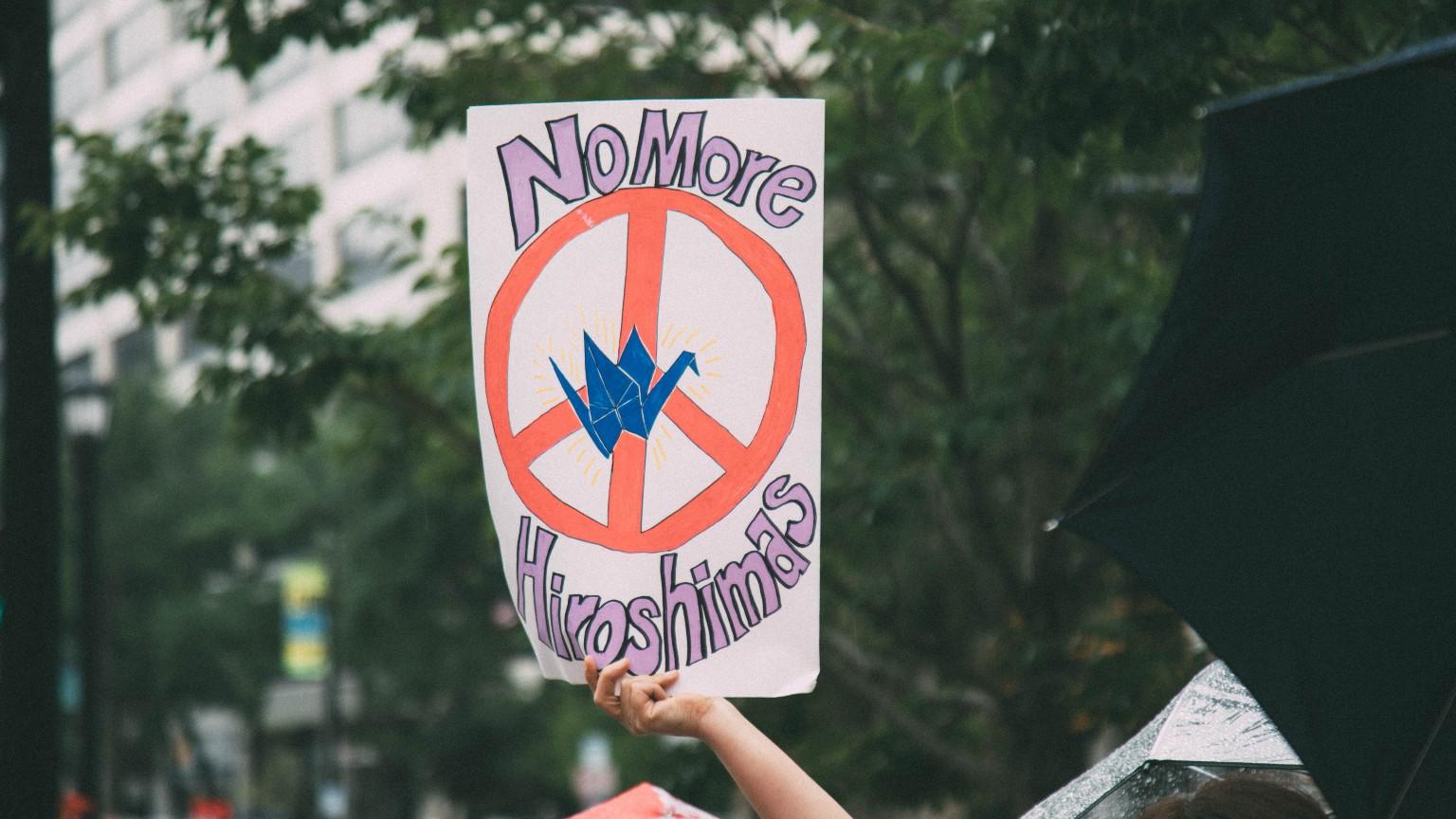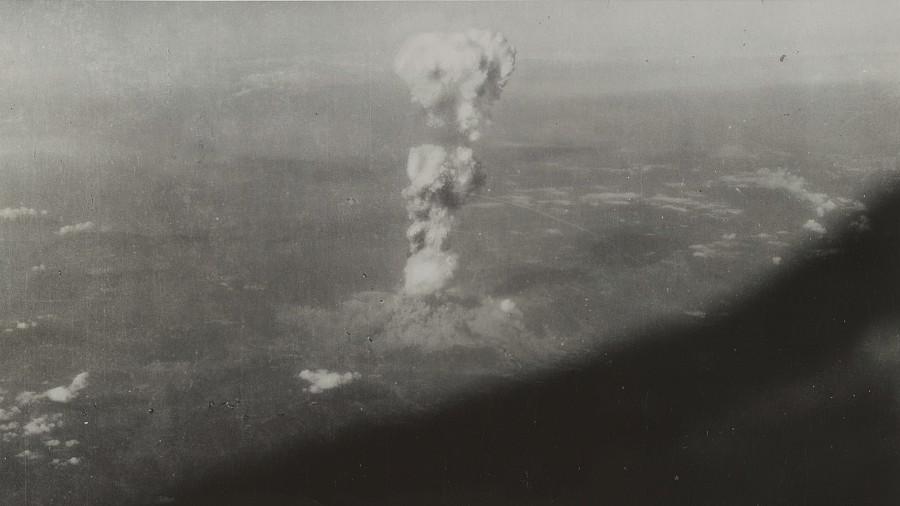 A participant holds up a sign during a peace rally held in Evanston on Aug. 5, 2023, to commemorate 78 years since the dropping of the first atomic bombs in Hiroshima and Nagasaki. (ThoughtPoet)
A participant holds up a sign during a peace rally held in Evanston on Aug. 5, 2023, to commemorate 78 years since the dropping of the first atomic bombs in Hiroshima and Nagasaki. (ThoughtPoet)
The much-anticipated film “Oppenheimer,” which follows the story of physicist J. Robert Oppenheimer as he works on building the first atomic bomb during World War II, has surpassed $500 million at the box office worldwide in three weeks.
But the film has prompted some viewers, like DePaul University professor Yuki Miyamoto, to shed light on the stories of the people — who some critics say were overlooked in the film — whose lives were directly and negatively intertwined with the film’s depicted events.
A peace rally was held in Evanston this past Saturday to commemorate 78 years since the dropping of the first atomic bombs in Hiroshima and Nagasaki. Miyamoto was a speaker at the event, which was hosted by the organization Chicago Area Peace Action.
Miyamoto was born in Hiroshima, and her mother was one mile away from ground zero when the U.S. dropped the first atomic bomb on the Japanese city.
Miyamoto said she wanted to represent the victims in her speech: those living in Hiroshima and Nagasaki at the time; the Indigenous people whose land was taken to develop and test nuclear bombs under the Manhattan Project; and the thousands of people who lived within 50 miles of the first nuclear detonation in Los Alamos, New Mexico.
“It’s not necessarily a bad thing to humanize Oppenheimer,” Miyamoto said in a later interview about her speech at the rally. “But I said, ‘When will the victims be humanized?’”
Miyamoto released the 2011 book “Beyond the Mushroom Cloud: Commemoration, Religion, and Responsibility after Hiroshima.” She’s been a resident of Chicago for nearly 30 years; her work focuses on nuclear ethics and environmental ethics.
The interview has been edited for length and clarity.
WTTW News: What experiences brought you to the U.S. to study nuclear and environmental ethics?
Yuki Miyamoto: Growing up in Japan, and growing up in Hiroshima especially, anti-nuclear sentiment is so strong and especially for my generation. The elementary school teachers were “Hibakusha,” which is the term for survivors or sufferers of the atomic bombing.
Witnessing that, I always wondered why their messages hadn’t gotten to people in the nuclear countries like the U.S., France, China. I just wanted to understand what kind of rationale, what kind of narrative, supports nuclear testing and occasionally justifying the atomic bombing.
I try to avoid the term “survivor” and it’s because you never know if you survived, and that’s what happened to my mother. She might have survived at the moment of the bombing, but then later on, she suffered from various ailments and passed away from radiation-induced illness.
What was your mother’s experience during the U.S. bombing of Hiroshima?
Miyamoto: Like many Hibakusha, or many sufferers, she didn’t tell me about her story and her experience, so I don’t know much about what happened. This is what I heard from her sister, my aunt: My mother was there at the time of the bombing. She was 6 years old, one mile away from the hypocenter and she didn’t have any external injuries, so she quote-unquote “survived.”
When she was in her 30s, she had Meniere’s disease, and in her 40s, she had to take a blood booster every other week because her blood-producing organ was not working properly, not producing healthy blood cells. In her 40s, she got cancer, and she passed away at the age of 62, so she suffered through even way after the bombing.
 First atomic bombing of Hiroshima, Japan on Aug. 6, 1945. (U.S. Library of Congress)
First atomic bombing of Hiroshima, Japan on Aug. 6, 1945. (U.S. Library of Congress)
What is the lasting impact that the bombings have on Japanese residents to this day?
Miyamoto: My experience is just in Hiroshima. When I went to college in a different city, Aug. 6 (the date of the Hiroshima bombing) is nothing to them, so it’s not necessarily the experiences shared throughout Japan.
The sufferers were discriminated against by the Japanese citizens, especially in the ’50s and ’60s. People were shunned, especially women, because people think that they are not healthy, they are incapable of having kids to begin with but also even if they have kids, the kids can be not in good health. There are layers of discrimination against the sufferers.
What does the bombing of Hiroshima and Nagasaki have to teach us when we think about nuclear ethics?
Miyamoto: I think this is one of the themes of the “Oppenheimer” movie, which is Prometheus. The movie is based on the book “American Prometheus,” and Prometheus is a bringer of fire, but also a symbol of perpetual self-destruction.
The U.S. has conducted 1,032 nuclear tests, and some of them were atmospheric, which means there are lots of people who suffer from the nuclear tests. The Trinity Test depicted in the movie, there were people within the radius of 50 miles, so we were destroying ourselves. I don’t want this discourse to be confined by national borders, but the U.S. is destroying itself by 1,032 nuclear tests. When we say national security, whose security is not taken into consideration? Maybe the Indigenous people, maybe uranium miners, maybe downwinders of the nuclear test.
This goes back to my first impression of Oppenheimer: Why is his suffering prioritized over the suffering of these people?
We are self-destroying. We are destroying ourselves, and that recognition is very important more so this day.
Contact Eunice Alpasan: @eunicealpasan | 773-509-5362 | [email protected]


